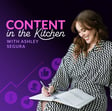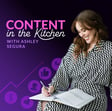
How to Create Brand Guidelines for Your Content
In this episode, Ashley Segura sits down with Katie Trant, founder of Foodie Brand Lab and agency director. Katie brings a unique perspective from both sides of the brand-building fence - as both a successful food blogger and branding agency expert.
Katie shares her compelling journey from food blogger to branding expert, showing how she developed her blog "The Muffin Myth" into the successful "Hey Nutrition Lady" brand. She also discusses the essential elements of brand building, explaining why a brand is more than just a visual identity and how content creators can effectively shape audience perceptions.
Whether you're a food blogger looking to build a stronger brand, a content creator seeking to understand brand strategy, or a marketer wanting to balance SEO with brand building, this episode offers actionable insights for creating a brand that resonates with your audience.
Subscribe now for your bi-weekly dose of content strategy wisdom that's practical, actionable, and twice as likely to make you question everything you thought you knew about SEO and content marketing!
*SPECIAL OFFER*
Created by a dear friend of ContentYum’s, Katie Trant is a branding expert with over a decade of experience. Her course is packed with everything you need to refine your brand strategy and grow your blog.
Katie has given ContentYum fans an exclusive $50!
Use Code: PODCAST at the checkout to get the discount OR Click the link down below 👇
https://foodiebrandlab.com/special-admission
Website:
https://contentyum.com/
Socials:
https://www.instagram.com/contentyumm/
https://www.linkedin.com/company/contentyum
https://www.tiktok.com/@contentyum
https://www.facebook.com/contentyumm
https://www.youtube.com/@Content-Yum
Follow Katie Trant:
Website: https://foodiebrandlab.com/
Instagram: https://www.instagram.com/foodiebrandlab/
Follow Ashley Segura:
Website: www.contentyum.com
LinkedIn: https://www.linkedin.com/in/ashley-segura/
Twitter: https://twitter.com/ashleymadhatter



